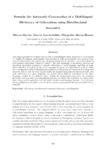Towards the Automatic Construction of a Multilingual Dictionary of Collocations using Distributional Semantics

Use este enlace para citar
http://hdl.handle.net/2183/36922
Excepto si se señala otra cosa, la licencia del ítem se describe como Atribution ShareAlike 4.0 International
Colecciones
- Investigación (FFIL) [877]
Metadatos
Mostrar el registro completo del ítemTítulo
Towards the Automatic Construction of a Multilingual Dictionary of Collocations using Distributional SemanticsFecha
2019Cita bibliográfica
García, M., García Salido ,M, Alonso-Ramos,M. (2019). Towards the Automatic Construction of a Multilingual Dictionary of Collocations using Distributional Semantics. In Electronic lexicography in the 21st century. Proceedings of the eLex 2019 conference. Brno: Lexical Computing, pp.747-762
Resumen
[Abstract] This paper presents the method used to create a multilingual online dictionary of collocations
of English, Portuguese, and Spanish. This resource is built automatically and contains three
types of collocations: verb–object (e.g., “[to] issue [an] invoice”), adjective–noun (“deep shame”),
and nominal compounds (“cigarette packet”). We take advantage of dependency parsing and
statistical association measures to compile collocations of each language, and then we align
them with their equivalents in the other languages by means of compositional methods which
use cross-lingual models of distributional semantics. Collocations are extracted from large and
assorted corpora, and the cross-lingual models are mapped using unsupervised approaches. For
each collocation in a given language, the system shows different equivalents in the other
languages, ranked by a confidence value. Besides the multilingual perspective, the resulting
dictionary can also serve as a monolingual resource to retrieve the collocates of a given base,
thus being a useful application to both native speakers and language learners. The dictionary
will be published as an online tool, and all the resources generated in this research will be freely
available.
Palabras clave
Collocations
Distributional semantics
Dictionary
Multilinguality
Distributional semantics
Dictionary
Multilinguality
Derechos
Atribution ShareAlike 4.0 International






